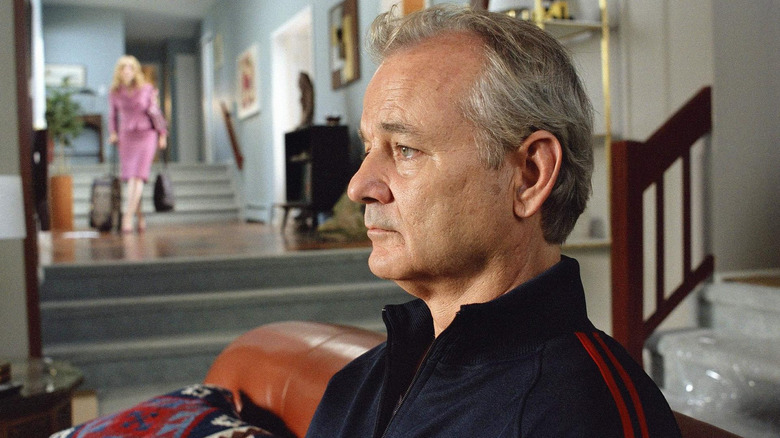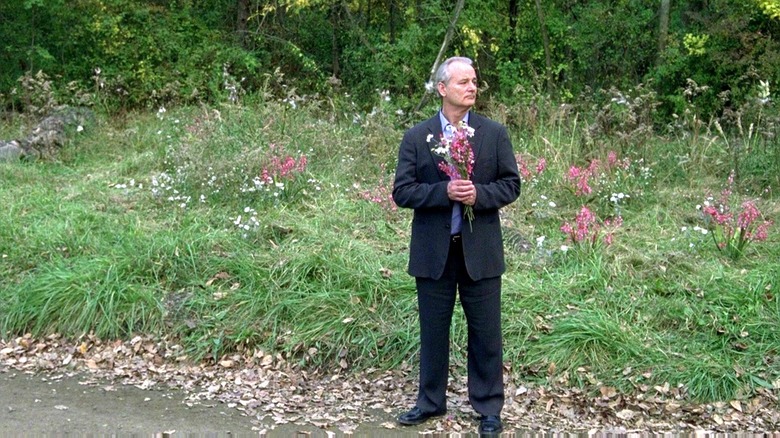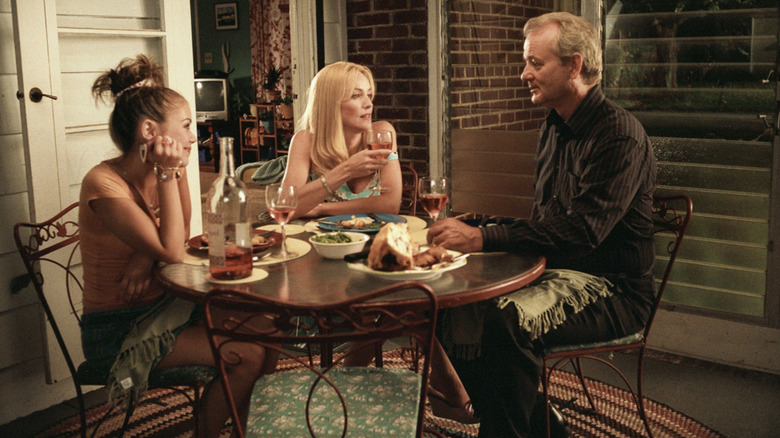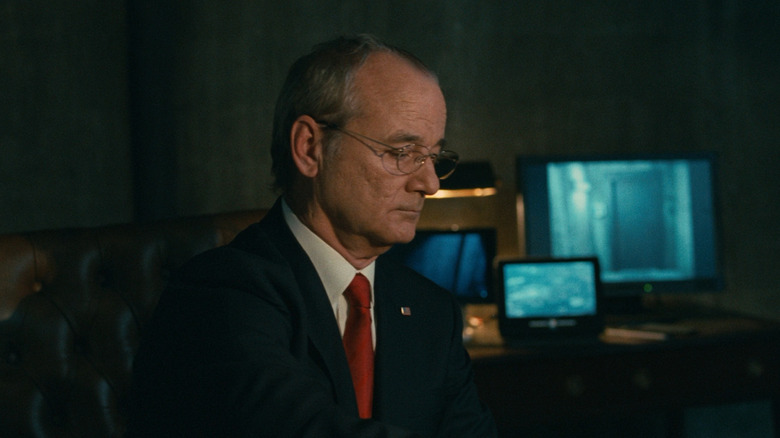The 2005 Deadpan Comedy Movie Bill Murray Called 'Perfect'
It's well known throughout Hollywood that Bill Murray doesn't have an agent. Back in 2019, Murray spoke with IndieWire about how his home phone used to ring and ring, pestering him with job offers and potential movie roles. He hated hearing from his agent, preferring to answer the phone if it was a friend just calling to chat. He preferred his privacy. Murray was in-demand enough that he could afford to set up a 1-800 number that he would only distribute to a few key filmmakers or casting directors. He understood that there were various studios around Hollywood where some beleaguered interns were commanded to "Get Bill Murray on the phone!" Luckily, those interns had his 1-800 number, which would direct callers to a computerized voice message system. Murray could then check the machine whenever he wanted, picking through demands at random.
This may be why Murray tends to work with the same directors repeatedly. Wes Anderson, for instance, likely leaves messages all the time, and Murray is happy to re-team with the filmmaker for yet another project. (Anderson and Murray have made nine movies together.)
It also seems really easy for Jim Jarmusch to get ahold of Murray. Jarmusch, the famously laconic filmmaker, first collaborated with Murray on the anthology conversation film "Coffee and Cigarettes" in 2003 (not to be confused with P.T. Anderson's "Cigarettes & Coffee"). In that film, Murray played a fry cook version of himself and got to have a coffee klatch with the RZA and the GZA.
Jarmusch and Murray then re-teamed in 2005 to make "Broken Flowers," a mood piece about a middle-aged man looking for an adult son he's never met. On an episode of "Hot Ones," Murray expressed his thought that "Broken Flowers" is perfect, and he hasn't made a comedy as perfect as that. This is a bold assertion, given the volume of amazing comedies he has made in his career.
What is Broken Flowers about?
Jarmusch's "Broken Flowers" was a mild hit as far as mid-2000s indie films go, earning over $47 million at the box office on a $10 million budget. In the film, Murray plays Don Johnston, a retired computer mogul whose life has settled into a laid-back form of creature-comfort driven inactivity. He was once an insufferable libertine and left a trail of ex-lovers in his wake, but now he mostly sits around and watches movies in his mansion. Don's girlfriend (Julie Delpy) breaks up with him at the beginning of the film, but it's hard to tell if he's hurt by the breakup or just utterly indifferent.
The same day, Don receives a mysterious letter in the mail. It's from a former lover of his who does not identify herself. She says that Don has a son, now 19, who might be looking for him. Don's neighbor Winston (Jeffrey Wright) does some freelance investigation and lets Don know that it could have come from one of five women in his past. Don, in turn, goes on a road trip to investigate and see if he can identify the woman with whom he had a son.
One of the women has died. The second is Laura, a closet organizer played by Sharon Stone. The third is a hippie-turned realtor named Dora, played by Francis Conroy. The fourth is an animal enthusiast played by Jessica Lange. And the fifth is a biker queen named Penny, portrayed by Tilda Swinton. "Broken Flowers" plays out in episodes as Don visits each of his exes and, in his uninspired way, asks leading questions about whether or not they have a child together. Sadly, none of his visits seems to be 100% definitive.
The meaning of Broken Flowers
"Broken Flowers" ends with Don encountering a young man (Mark Webber), living locally, who has only recently arrived in town on some unspecified mission. Don begins to suspect that this young man is his son and takes him to dinner. In an uncharacteristic show of emotion, Don finally admits that to the young man that he may be his father. This, however, freaks out the young man, and he flees the diner. As Don chases after the first young man, he sees another young man drive past in a car ... and the other young man happens to look a lot like him. Indeed, the other young man is played by Homer Murray, Bill's real-life son. The two lock eyes. The end.
Here's what Murray had to say about the film during his "Hot Ones" appearance:
"I thought the movie 'Broken Flowers,' that Jim Jarmusch directed, I didn't think I could do better than that. I thought that was sort of a perfect movie. It really did happen. So everything I had to do, I knew how to do. And things that I hadn't done before, I was able to live. And because it was all happening, really truly happening to me, it came across as a performance."
"Broken Flowers" is about a man reopening a soul he thought had been nailed shut. Don has a mystery in front of him, but he doesn't seem particularly motivated. Don's casual approach, which Murray plays with perfection, at first belies a kind of Olympian emotional distance, showing that Don may have lost the ability to care about others and doesn't even seem to be interested in himself.
What makes "Broken Flowers" stand out is that Don, at some point along the way, seems to grow a soul. There isn't a single cathartic moment where he transforms, but his conversations with former lovers lets him look into himself in a way he may not have realized he was doing. Jarmusch forces a distant character to become less distant by Platonically examining his own life.
Murray and Jarmusch's other collaborations
As mentioned, Jarmusch and Murray first worked together on "Coffee and Cigarettes," a delightfully weird series of 11 short films about, well, coffee and cigarettes. Some are flashy and ambitious, like the short in which Cate Blanchett plays a pair of identical cousins. Some are seemingly invented on the fly, as when Iggy Pop and Tom Waits trade barbs over each other's careers (the jukebox doesn't have any Tom Waits songs on it, for instance). The Billy Murray short with the RZA and the GZA is surreal in that it, too, feels wholly improvised. The RZA and the GZA seem baffled by Murray's insistence on behaving like a fry cook and are terrified when he takes their suggestion that he gargle with oven cleaner.
Murray also stars in "The Limits of Control" as the final target of an assassin, played by Isaach de Bankolé. The Murray character, credited only as "American," is bitter and cusses at the assassin. He lives in a building with the axiom "Life is worth nothing" emblazoned over the entrance. If "Broken Flowers" is about finding a scrap of living humanity deep inside a long-detached human being, then "The Limits of Control" is about the emptiness of everything. Of course, the film is utterly terrible, so it's hard to tell what it might be about.
Murray and Jarmusch have since collaborated on the sleepy zombie film "The Dead Don't Die," wherein Murray played a cop. He and his partner, played by Adam Driver, drive around and discuss the structure of movies, even going so far as to comment on the film they are currently in. "The Dead Don't Die" isn't one of Jarmusch's better film, but it's funny in that deadpan Jarmusch way. The director is currently working on a film called "Father, Mother, Sister, Brother," which doesn't yet have a release date. Sadly, Murray isn't in it. He can currently be seen in "The Friend."



